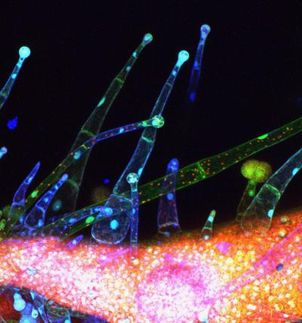Cornell receives $500,000 to tackle salmonella in tomatoes
Advertisement
Two experts from Cornell are teaming up to tackle salmonella contamination in produce, thanks to a $500,000 grant from the Agriculture and Food Research Initiative through the U.S. Department of Agriculture (USDA).
Cornell was one of 24 institutions to receive such grants to reduce food-borne illnesses and deaths from microbial contamination. Craig Altier, a salmonella specialist at the Animal Health Diagnostic Center at Cornell's College of Veterinary Medicine, will work with Greg Martin, Cornell professor of plant pathology and plant-microbe biology and an expert on tomato disease resistance at the Cornell-affiliated Boyce Thompson Institute for Plant Research, to investigate how salmonella interacts with tomatoes with the hope of finding ways to stop its spread.
"My lab explores how salmonella interacts with animal intestinal tracts," said Altier, associate professor of population medicine and diagnostic science. "Bacteria are very frugal creatures; they turn genes on and off only when they need to. They only turn on the genes that make animals sick when they know they're in an animal, and we want to know how this process works in plants. We will look at which bacterial genes turn on when salmonella enters a tomato and try to figure out how to intervene."
Unwittingly sharing our food with unseen organisms sends thousands to the hospital each year. Some 50 million Americans get sick every year after consuming food-poisoning pathogens, according to the U.S. Centers for Disease Control and Prevention, and 3,000 of those cases are fatal. Salmonella bacteria pose the biggest food-borne health threat in the United States. While the quest for cleaner food reduced cases of many food-borne pathogens during the past 15 years, salmonella infections continue to rise.
Altier will grow mutant strains of salmonella in his lab to study how the bacteria affect tomatoes when they lack certain genes. He will take strains to Martin's lab to test them on tomato plants while Martin studies the plants' immune responses. After running them through the course of infection, Altier will remove the salmonella from the plants to analyze in his lab.
"A number of recent salmonella outbreaks started with contaminated produce," said Martin. "My lab studies how the tomato immune system acts against certain bacterial pathogens, and this new project will test whether the plant immune system interferes with salmonella's ability to survive on leaves and fruits. If it does, we may be able to breed new varieties that suppress salmonella growth, which could have implications for lessening salmonella contamination in many different crop plants."


















































